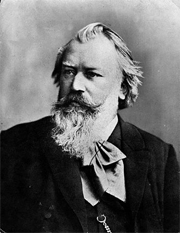If I were asked to pick my favorite symphony, well, I couldn’t. If I were backed into a corner and really pressured, I still couldn’t. But if it were a matter of life and death and I were making short lists, Symphony No. 1 by Brahms would be on all of them. Some have argued that the First isn’t really his first symphonic work; that would be Variations on a Theme of Haydn. Which, if granted, might not change my answer. (“5✭♫” series introduction here; with an explanation of why the title may look broken.)

The Context · There’s not that much in the way of soul-clenching drama or hidden secrets around Johannes Brahms. When you’re talking about Dead Germans who wrote Big Symphonies, he’s the one after Beethoven, alphabetically and chronologically. He was called old-fashioned in his lifetime, and there’s nothing in his work that challenges the ear.
Even people who think his music is boring have admired the orchestration and the incredibly-lush sonic textures. I personally like the Big Serious Works, but he wrote lots of popular waltzes and lieder and of course the Lullaby that the tacky mobile we fasten onto my baby daughter’s crib plays when you wind it up.
The Music · Millions, probably, of incredibly erudite words have been written about the First; I don’t think I have much to add, so I’ll keep this short. Item: The structure is formal, but that doesn’t get in the way of a whole lot of really outstanding melodies. Item: It sounds best played really, really, loud. Item: Especially the whole first movement and the whole last movement. Item: I hate it when classical music leaves you wondering “Is this the end? Is the music actually over?” Brahms doesn’t; he uses lots of exclamation points and draws a line under it and there is absolutely no doubt. Item: The last movement quotes Beethoven’s Ode To Joy. Someone pointed out the similarity to Brahms and he said “Any ass can hear that”. Except for, Brahms orchestrates the strings better. Item: Those big slow slow horns in the last movement; oh my goodness.
Then there’s the Haydn Variations; if you define “Symphony” to mean “Large-scale orchestral work constructed on formal principles”, this would be one. It’s formal all right, way out in Bach territory; and the big central melody is plenty strong enough to hold up all the formal diddling with no observable stress or strain. Then that last variation comes around and neatly sums up all the chopping and changing in a tone of cool triumph.
Sampling It · It’s easy to say “Don’t even think about downloading this, go buy a good CD or two”; but not so easy to say which recording. The good news is that both of these are hard to screw up. For the Haydn Variations, the choice is pretty clear: Mercury Living Presence 434 326-2, Dorati Conducts Brahms & Enesco, which also has Brahms’ fine Hungarian Dances and Enesco’s Roumanian Rhapsody No. 2. Magnificent.
As for the Symphony, though, I don’t know. I have a Giulini/Wiener Philharmoniker CD on Deutsche Grammophon that has both the First and the Haydn and it’s pretty good.
But over the years, I’ve probably listened most of all to EMI Classics 7 54286 2, also pairing the First and the Haydn, featuring Roger Norrington and the London Classical Players. Norrington is famous for “Original Instruments” recordings, and indeed, the orchestras of Brahms’ time were smaller and thinner than today’s. Since Brahms’ music is big and thick, I suspect that a well-done modern performance is probably a better choice. But Norrington’s take is incredibly transparent and intense and well-recorded, and I love it.

Comment feed for ongoing:
From: Beat Bolli (Oct 10 2006, at 03:37)
Hi Tim
This is off-topic (off-fragment? :-), but your ATOM feed shows <updated> and <published> timestamps of 2006-10-10T13:00:00-07:00 for this fragment. I think it's not already that late in Vancouver, or is it?
[link]
From: Mogens Hessellund (Oct 10 2006, at 04:21)
Also a 5'er in my iTunes library (Haitink, London SO) - allthough prefer Tragic Ouverture as the companion.
[link]
From: Alan Little (Oct 10 2006, at 08:38)
I'm a Furtwängler fan for the symphony (Berlin or North German Radio Orchestra), but still on the lookout for the ultimate Haydn Variations. I'll check out the Dorati, thanks.
[link]
From: Sjan Evardsson (Oct 10 2006, at 13:07)
While I do admire the rich, warm feeling of Brahms' compositions, I would have to go with Beethoven's 9th as my favorite. It's nice to know that there are more folks out there with broad musical tastes!
[link]
From: Mike Kozlowski (Oct 10 2006, at 20:59)
As for downloading, it's worth noting that the Philadelphia Orchestra has a < a href="http://www.thephiladelphiaorchestra.com/show.asp?show=843&artist=104">recording of the Haydn Variations</a> available as a $5-ish download. I suspect it's not the definitive version, but downloadable music that's not DRMed, and is available in a losslessly-compressed open-source format (FLAC) is novel enough to be worth checking out in either case.
[link]
From: Bob DuCharme (Oct 11 2006, at 06:13)
Interesting funfact from my bass teacher: having a bass player as a father, Brahms wrote really great bass parts.
[link]
From: Alex Brown (Oct 12 2006, at 04:02)
On the question of what Brahms' first orchestral work is, a surprising answer might be his Piano Quartet in G Minor Op. 25, as orchestrated by Schoenberg!
This outrageous piece has several distinctly non-Brahmsian sounds thanks to an orchestra which includes xylophone, glockenspiel, and cymbals - it's worth a listen if only as a curio.
For a fierce Brahms 1, it's worth seeking out one of Toscanini's recordings. The 1953 commercial one on RCA/BMG is pretty good (though in dry mono sound), but for my money a live Carnegie Hall recording from May 1940 (on Naxos) trumps it, and in only slightly worse sound.
[link]